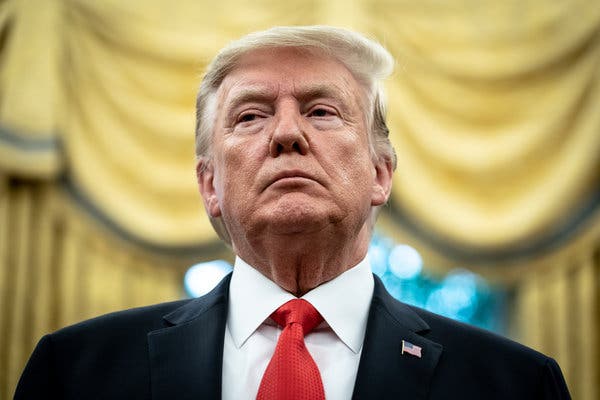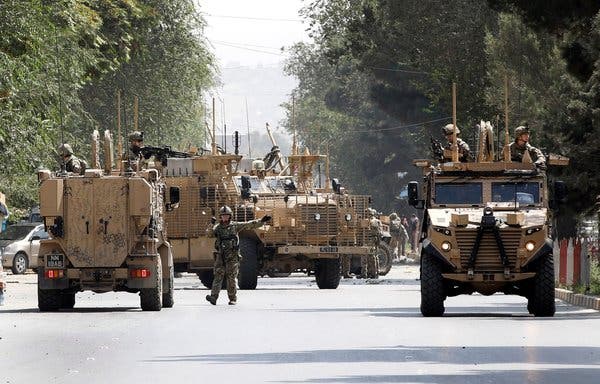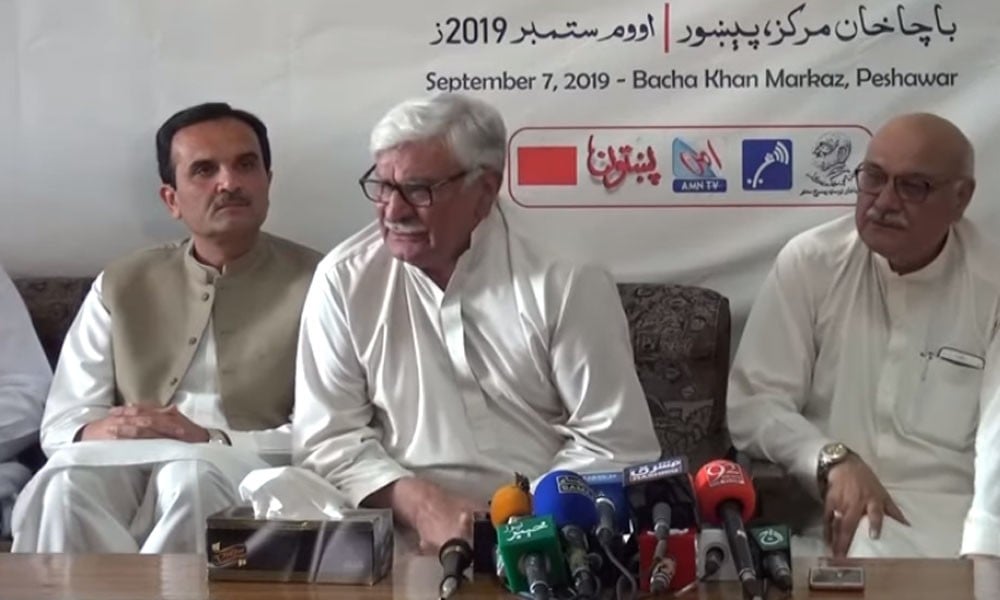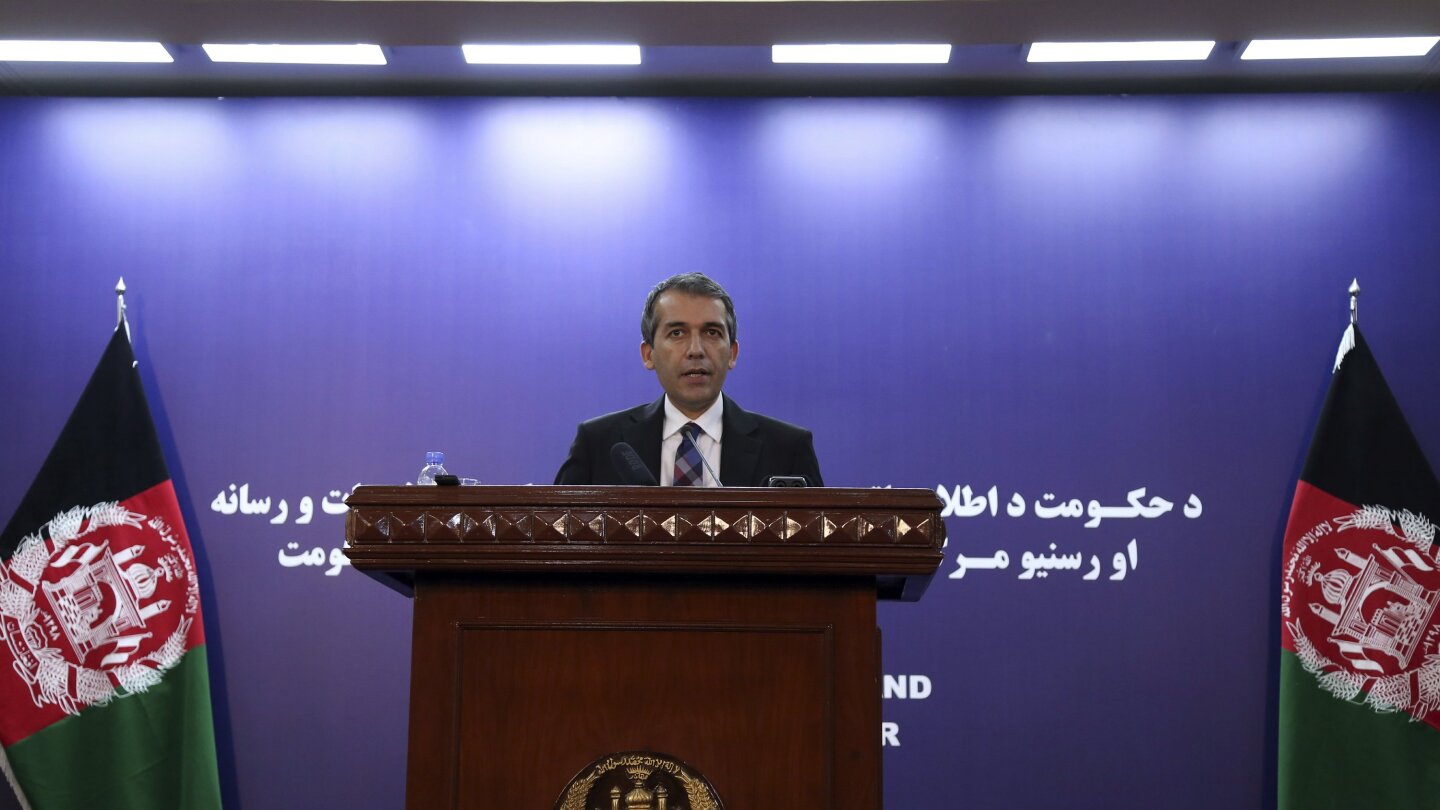Trump Says He’s Called Off Negotiations With Taliban After Afghanistan Bombing
Trump Says He’s Called Off Negotiations With Taliban After Afghanistan Bombing
Image

President Trump said on Saturday that he had canceled a secret meeting at Camp David with Taliban leaders and the president of Afghanistan.CreditCreditErin Schaff/The New York Times
By Michael Crowley, Lara Jakes and Mujib Mashal
When a story starts with a city, it means we were there to report it.
Don’t show me messages like this
WASHINGTON — President Trump said on Saturday that he had canceled a secret meeting at Camp David with Taliban leaders and the president of Afghanistan and had called off monthslong negotiations with the Afghan insurgent group that appeared to be nearing a peace agreement.
“Unbeknownst to almost everyone,” Mr. Trump wrote in a series of tweets, Taliban leaders and the Afghan president, Ashraf Ghani, were headed to the United States on Saturday for what would have been a historic meeting at Camp David.
But Mr. Trump angrily said that “in order to build false leverage,” the Taliban had admitted to a suicide car bomb attack on Thursday that had killed an American soldier and 11 others in the capital of Kabul. “I immediately cancelled the meeting and called off peace negotiations,” he wrote.
“If they cannot agree to a ceasefire during these very important peace talks, and would even kill 12 innocent people, then they probably don’t have the power to negotiate a meaningful agreement anyway,” Mr. Trump wrote. “How many more decades are they willing to fight?”
Sign Up for On Politics With Lisa Lerer
A spotlight on the people reshaping our politics. A conversation with voters across the country. And a guiding hand through the endless news cycle, telling you what you really need to know.
SIGN UP
ADVERTISEMENT
Mr. Trump’s announcement was startling for multiple reasons. A surprise summit at Camp David with leaders of an insurgent group that has killed thousands of Americans since the October 2001 invasion of Afghanistan would have been a sensational diplomatic gambit, on par with Mr. Trump’s meetings with the once-reclusive North Korean leader, Kim Jong-un. A senior administration official said the meeting had been planned for Monday, just two days before the anniversary of the Sept. 11, 2001, attacks, which were plotted from Afghanistan and led to the United States’ invasion of the country.
The move also appears to scuttle — for now — Mr. Trump’s longstanding hope to deliver on a campaign promise to withdraw American troops from an 18-year conflict that he has called an aimless boondoggle. It comes amid stubborn resistance within Afghanistan’s government about the emerging agreement, not only for security reasons but because Mr. Ghani has been determined to preserve an election planned for Sept. 28, which he is favored to win. The Taliban have insisted on postponing the election.
Those have been under way since last winter, when Mr. Trump’s special envoy for Afghanistan, Zalmay Khalilzad, began trekking to Doha, Qatar, for meetings with Taliban representatives. United States and foreign officials said that the talks had reached an advanced stage and, until Saturday night, that an agreement with the Pashtun insurgent group that once harbored the Qaeda mastermind Osama bin Laden was close at hand.
In nine rounds of negotiations, Mr. Khalilzad painstakingly worked toward a final peace agreement that would be brokered between the Taliban and Afghan government officials and civil leaders.
Mr. Khalilzad has pledged to draw down American military troops in exchange for a partial cease-fire by the Taliban. In a recent interview with the Afghan channel ToloNews, he said 5,400 United States forces would leave Afghanistan within 135 days after the agreement is signed.
That agreement would initially only reduce the number of American troops to about what it was when Mr. Trump took office in 2017.
Image

The site of a suicide attack in Kabul last week. Mr. Trump said that the Taliban had admitted to one such attack that left an American soldier and 11 others dead.CreditHedayatullah Amid/EPA, via Shutterstock
As for the remaining 8,600 American forces, they would leave according to a gradual timeline that officials could be within 16 months.
That would allow Mr. Trump, who has been routinely critical of expensive American interventions in the Muslim world, to declare that he had ended a long conflict that has grown unpopular and obscure with the American public, and to boast that he had achieved an outcome his predecessor, President Barack Obama, sought in vain.
The reality could be more complicated. Mr. Trump has hinted that the United States would retain “strong intelligence” in the country, language that some experts believe to describe plans for a robust presence of armed C.I.A. operatives. And even if an initial deal with the Taliban were to be reached, its enforcement could face numerous pitfalls.
Critics of the nascent agreement — including the former American commander in Afghanistan, the retired Army general, David Petraeus — have warned that it could lead to the return of Al Qaeda. Several have invoked the example of Mr. Obama’s troop withdrawal from Iraq, which allowed for the emergence of the Islamic State in Iraq and Syria.
Those critics have pointed to a continued high tempo of Taliban attacks as a sign that the theocratic insurgent group cannot set aside violence. The bombing cited by the president involved a car bomb detonated on Thursday at a checkpoint near the American Embassy in Kabul.
Afghan government officials who have been briefed on the negotiations privately said Mr. Khalilzad did not force enough concessions from the Taliban to ensure stability as the American military leaves Afghanistan.
One official said the agreement between Mr. Khalilzad and the Taliban will not assure national elections on Sept. 28, as Mr. Ghani has demanded. Rather than requiring a nationwide cease-fire, it calls for a reduction of violence in Kabul and Parwan. And, the Afghan government official said, it may allow the Taliban to continue referring to itself in official conduct as the “Islamic Emirate” — as it did when the extremist group was ruling Afghanistan with fear.
If anything, said one Afghan official, the negotiations appear to have only emboldened the Taliban. The official spoke on the condition of anonymity to discuss the closed-door briefings more frankly.
“They are much more emboldened and they have a chance to take over,” the Afghan official said on Wednesday.
Hours after the Thursday bombing in Kabul, Mr. Khalilzad and the top commander in Kabul arrived for a surprise meeting with the Taliban in Doha. They went straight into unexpected and unannounced talks that lasted into the early morning.
At the time, it was unclear what they were negotiating when the special envoy had declared the agreement was final “in principle.” Officials refused to confirm that it was related to the uptick in violence, but now it seems clear it was a last-minute effort to salvage the process.
Reacting to Mr. Trump’s announcement, one Western official aware of the peace developments said that it was nothing short of tragic and that reviving the peace process would not be easy.
The official said the two sides were on the verge of reaching a deal, and a completion of that appeared to have been jeopardized by showmanship. Now it has created an environment where the Taliban, as well as a skeptical region that includes Iran and Russia, will conclude that no process with the Americans can be trusted, the official said.
Michael Crowley and Lara Jakes reported from Washington, and Mujib Mashal from Kabul, Afghanistan.
Trump Says He’s Called Off Negotiations With Taliban After Afghanistan Bombing
Image

President Trump said on Saturday that he had canceled a secret meeting at Camp David with Taliban leaders and the president of Afghanistan.CreditCreditErin Schaff/The New York Times
By Michael Crowley, Lara Jakes and Mujib Mashal
- Sept. 7, 2019Updated 9:58 p.m. ET
When a story starts with a city, it means we were there to report it.
Don’t show me messages like this
WASHINGTON — President Trump said on Saturday that he had canceled a secret meeting at Camp David with Taliban leaders and the president of Afghanistan and had called off monthslong negotiations with the Afghan insurgent group that appeared to be nearing a peace agreement.
“Unbeknownst to almost everyone,” Mr. Trump wrote in a series of tweets, Taliban leaders and the Afghan president, Ashraf Ghani, were headed to the United States on Saturday for what would have been a historic meeting at Camp David.
But Mr. Trump angrily said that “in order to build false leverage,” the Taliban had admitted to a suicide car bomb attack on Thursday that had killed an American soldier and 11 others in the capital of Kabul. “I immediately cancelled the meeting and called off peace negotiations,” he wrote.
“If they cannot agree to a ceasefire during these very important peace talks, and would even kill 12 innocent people, then they probably don’t have the power to negotiate a meaningful agreement anyway,” Mr. Trump wrote. “How many more decades are they willing to fight?”
Sign Up for On Politics With Lisa Lerer
A spotlight on the people reshaping our politics. A conversation with voters across the country. And a guiding hand through the endless news cycle, telling you what you really need to know.
SIGN UP
ADVERTISEMENT
Mr. Trump’s announcement was startling for multiple reasons. A surprise summit at Camp David with leaders of an insurgent group that has killed thousands of Americans since the October 2001 invasion of Afghanistan would have been a sensational diplomatic gambit, on par with Mr. Trump’s meetings with the once-reclusive North Korean leader, Kim Jong-un. A senior administration official said the meeting had been planned for Monday, just two days before the anniversary of the Sept. 11, 2001, attacks, which were plotted from Afghanistan and led to the United States’ invasion of the country.
The move also appears to scuttle — for now — Mr. Trump’s longstanding hope to deliver on a campaign promise to withdraw American troops from an 18-year conflict that he has called an aimless boondoggle. It comes amid stubborn resistance within Afghanistan’s government about the emerging agreement, not only for security reasons but because Mr. Ghani has been determined to preserve an election planned for Sept. 28, which he is favored to win. The Taliban have insisted on postponing the election.
- The details of the meeting and exact timeline of its scheduling and cancellation, as described by Mr. Trump, were unclear on Saturday night. On Friday, Afghan officials confirmed that Mr. Ghani postponed a planned meeting in Washington. The senior Trump administration official said the decision to cancel the meeting had been made on Thursday, but Mr. Trump had delayed his announcement.
Those have been under way since last winter, when Mr. Trump’s special envoy for Afghanistan, Zalmay Khalilzad, began trekking to Doha, Qatar, for meetings with Taliban representatives. United States and foreign officials said that the talks had reached an advanced stage and, until Saturday night, that an agreement with the Pashtun insurgent group that once harbored the Qaeda mastermind Osama bin Laden was close at hand.
In nine rounds of negotiations, Mr. Khalilzad painstakingly worked toward a final peace agreement that would be brokered between the Taliban and Afghan government officials and civil leaders.
Mr. Khalilzad has pledged to draw down American military troops in exchange for a partial cease-fire by the Taliban. In a recent interview with the Afghan channel ToloNews, he said 5,400 United States forces would leave Afghanistan within 135 days after the agreement is signed.
That agreement would initially only reduce the number of American troops to about what it was when Mr. Trump took office in 2017.
Image

The site of a suicide attack in Kabul last week. Mr. Trump said that the Taliban had admitted to one such attack that left an American soldier and 11 others dead.CreditHedayatullah Amid/EPA, via Shutterstock
As for the remaining 8,600 American forces, they would leave according to a gradual timeline that officials could be within 16 months.
That would allow Mr. Trump, who has been routinely critical of expensive American interventions in the Muslim world, to declare that he had ended a long conflict that has grown unpopular and obscure with the American public, and to boast that he had achieved an outcome his predecessor, President Barack Obama, sought in vain.
The reality could be more complicated. Mr. Trump has hinted that the United States would retain “strong intelligence” in the country, language that some experts believe to describe plans for a robust presence of armed C.I.A. operatives. And even if an initial deal with the Taliban were to be reached, its enforcement could face numerous pitfalls.
Critics of the nascent agreement — including the former American commander in Afghanistan, the retired Army general, David Petraeus — have warned that it could lead to the return of Al Qaeda. Several have invoked the example of Mr. Obama’s troop withdrawal from Iraq, which allowed for the emergence of the Islamic State in Iraq and Syria.
Those critics have pointed to a continued high tempo of Taliban attacks as a sign that the theocratic insurgent group cannot set aside violence. The bombing cited by the president involved a car bomb detonated on Thursday at a checkpoint near the American Embassy in Kabul.
Afghan government officials who have been briefed on the negotiations privately said Mr. Khalilzad did not force enough concessions from the Taliban to ensure stability as the American military leaves Afghanistan.
One official said the agreement between Mr. Khalilzad and the Taliban will not assure national elections on Sept. 28, as Mr. Ghani has demanded. Rather than requiring a nationwide cease-fire, it calls for a reduction of violence in Kabul and Parwan. And, the Afghan government official said, it may allow the Taliban to continue referring to itself in official conduct as the “Islamic Emirate” — as it did when the extremist group was ruling Afghanistan with fear.
If anything, said one Afghan official, the negotiations appear to have only emboldened the Taliban. The official spoke on the condition of anonymity to discuss the closed-door briefings more frankly.
“They are much more emboldened and they have a chance to take over,” the Afghan official said on Wednesday.
Hours after the Thursday bombing in Kabul, Mr. Khalilzad and the top commander in Kabul arrived for a surprise meeting with the Taliban in Doha. They went straight into unexpected and unannounced talks that lasted into the early morning.
At the time, it was unclear what they were negotiating when the special envoy had declared the agreement was final “in principle.” Officials refused to confirm that it was related to the uptick in violence, but now it seems clear it was a last-minute effort to salvage the process.
Reacting to Mr. Trump’s announcement, one Western official aware of the peace developments said that it was nothing short of tragic and that reviving the peace process would not be easy.
The official said the two sides were on the verge of reaching a deal, and a completion of that appeared to have been jeopardized by showmanship. Now it has created an environment where the Taliban, as well as a skeptical region that includes Iran and Russia, will conclude that no process with the Americans can be trusted, the official said.
Michael Crowley and Lara Jakes reported from Washington, and Mujib Mashal from Kabul, Afghanistan.



